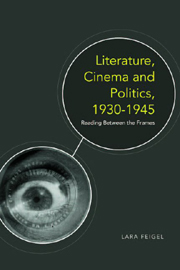Book contents
- Frontmatter
- Contents
- Acknowledgements
- List of Figures
- Introduction
- 1 Radical Cinema
- 2 Mass Observing: The 1930s Documentary Gaze
- 3 The Documentary Movement and Mass Leisure, 1930–1945
- 4 Camera Consciousness
- 5 Framing History: Virginia Woolf and the Politicisation of Aesthetics
- 6 ‘The savage and austere light of a burning world’: The Cinematic Blitz
- Afterword
- Endnotes
- Bibliography
- Index
1 - Radical Cinema
Published online by Cambridge University Press: 12 September 2012
- Frontmatter
- Contents
- Acknowledgements
- List of Figures
- Introduction
- 1 Radical Cinema
- 2 Mass Observing: The 1930s Documentary Gaze
- 3 The Documentary Movement and Mass Leisure, 1930–1945
- 4 Camera Consciousness
- 5 Framing History: Virginia Woolf and the Politicisation of Aesthetics
- 6 ‘The savage and austere light of a burning world’: The Cinematic Blitz
- Afterword
- Endnotes
- Bibliography
- Index
Summary
The writers who found cinema a source of revolutionary hope focused on its techniques as well as its popularity. Cinema could expose social inequalities by cutting between upper-class and working-class lives. Through the close-up, it could decentre the human, creating a democracy between people and objects. By implicating the viewer physically in the picture, filmmakers could counter apathy with an embodied alertness. At the same time, cinema could confront the spectator with an unsettling form of absent presence, rendering the world ghostly and unreal.
This chapter investigates a series of photographic or cinematic techniques or properties, as part of a more general attempt to pinpoint what it meant to be simultaneously cinematic and politically engaged in the 1930s. The radical properties of cinema were located in subject matter as well as style. Left-wing filmmakers could portray working-class life and leisure or they could use techniques such as montage in the service of a left-wing political message. Here I focus more on filmic technique, with filmic subject matter forming one of the main strands of discussion in Chapters 2 and 3. I also explore the appeal of the inherent characteristics of the filmic medium. Cinema's status as an indexical medium and its power to promote a new kind of embodied spectatorship were seen as radical because they gave it the force to transform the relationship between subject and world.
- Type
- Chapter
- Information
- Literature Cinema and Politics 1930–1945Reading Between the Frames, pp. 17 - 62Publisher: Edinburgh University PressPrint publication year: 2010



